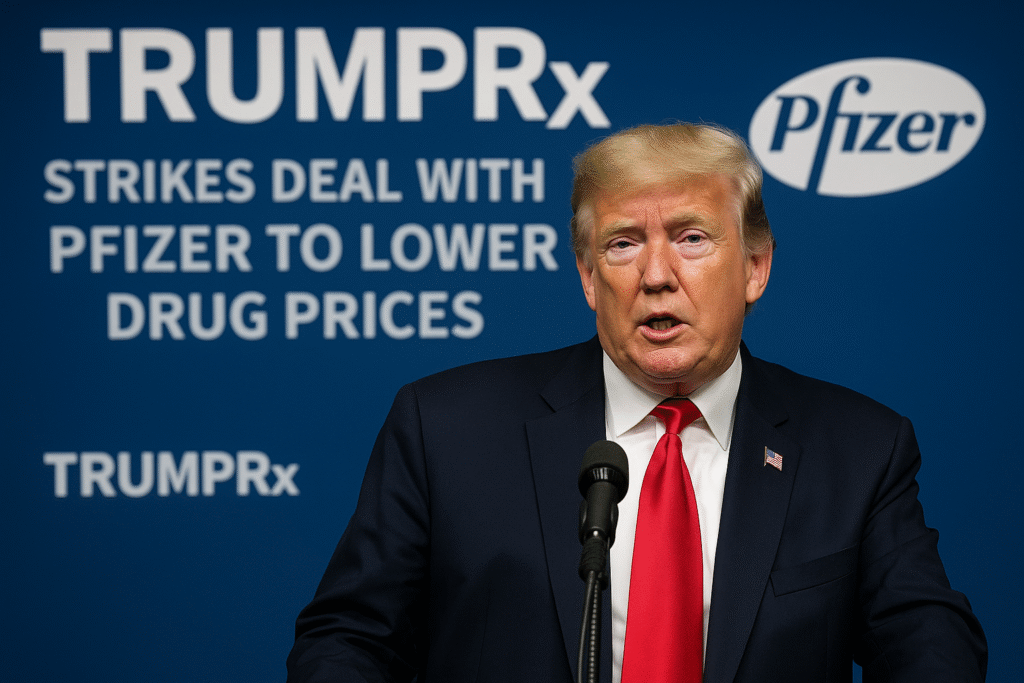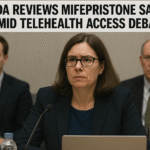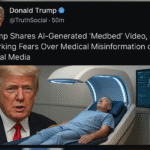By Harshit | October 2, 2025 | Washington, D.C. | 10:30 AM EDT
President Donald Trump on Tuesday unveiled a multipronged initiative aimed at lowering prescription drug costs in the United States. Central to the plan is the launch of TrumpRx, a direct-to-consumer website that will allow Americans to compare prices and access discounted medications, along with a sweeping agreement with Pfizer to reduce the cost of many of its drugs.
“The United States is done subsidizing the health care of the rest of the world,” Trump said at a news conference. “By taking this bold step, we’re ending the era of global price gouging at the expense of American families.”
Pfizer Deal and Most Favored Nation Pricing
Pfizer became the first pharmaceutical company to comply with all demands outlined in a July letter from Trump to major drugmakers. The company agreed to sell medicines to Medicaid at “Most Favored Nation” prices, meaning the lowest cost available in peer countries, and to offer many of its primary care and some specialty drugs at an average 50% discount through the TrumpRx program.
Pfizer will also expand domestic manufacturing and receive a three-year reprieve on certain tariffs on pharmaceutical imports. According to a senior administration official, additional companies have already negotiated similar agreements, while others are in discussions.
The TrumpRx website, scheduled to go live in early 2026, will not directly sell medications. Instead, it will function as a portal where consumers can search for medicines and be redirected to manufacturers’ direct-to-consumer channels.
Challenges in Drug Pricing
While Trump touted the new initiative as a solution to high drug costs, experts cautioned that the plan may not significantly reduce what Americans pay. Most prescriptions in the U.S. are covered by insurance, and multiple intermediaries—such as pharmacy benefit managers and insurers—impact the final price consumers face.
“New Trump drug website is likely irrelevant as few will pay out of pocket,” said Chris Meekins, managing director of health policy research at Raymond James. Stacie Dusetzina, a professor at Vanderbilt University Medical Center, added that many of the medicines highlighted in Trump’s announcement are rarely used in the U.S., with few exceptions like Xeljanz for rheumatoid arthritis.
Even with a TrumpRx discount of 40% on some high-priced drugs, the final cash cost could remain prohibitive. For instance, Xeljanz, which has a list price exceeding $6,000 per month, would still cost patients around $3,600 monthly after the discount.
Direct-to-Consumer Sales
Trump’s push for direct-to-consumer sales reflects a broader interest in bypassing traditional insurance channels. Some drugmakers, such as Novo Nordisk, have already implemented programs enabling patients to purchase medications like Ozempic directly, at a lower cost than insurance-based pricing.
The Pharmaceutical Research and Manufacturers of America (PhRMA) also introduced AmericasMedicines.com to facilitate direct purchases from drug companies. The White House indicated TrumpRx would operate similarly, offering transparency in pricing and eliminating hidden fees.
International Price Implications
Trump acknowledged that reducing prices in the U.S. could lead to higher costs abroad, which he described as “fair.” The administration plans to enforce tariffs on pharmaceutical imports from companies that do not meet domestic manufacturing or price requirements, including a potential 15% levy on imports from the European Union.
Pfizer pledged to invest $70 billion in research and manufacturing projects in the U.S., alongside the tariff reprieve, demonstrating industry cooperation under Trump’s approach.
Skepticism from Industry Experts
Despite Trump’s announcement, experts remain skeptical about the initiative’s effectiveness. Critics note that the president does not have the legal authority to mandate Most Favored Nation pricing, and price reductions may primarily affect foreign markets rather than domestic consumers.
Several companies have already signaled similar moves. Eli Lilly raised prices for its weight-loss drug Mounjaro in the U.K. to lower U.S. costs, while Bristol Myers Squibb matched U.K. pricing for its schizophrenia medication Cobenfy.
“If this is all that President Trump does on drug pricing, it is likely a win for the pharmaceutical industry,” Meekins said.
Conclusion
Trump’s announcement represents the latest in his ongoing efforts to lower U.S. drug prices, a focus that has been central to his political messaging since his first campaign. While the deals with Pfizer and the launch of TrumpRx may offer some savings for specific consumers, experts caution that broader systemic issues in insurance coverage, distribution, and international pricing could limit the impact on everyday Americans.







